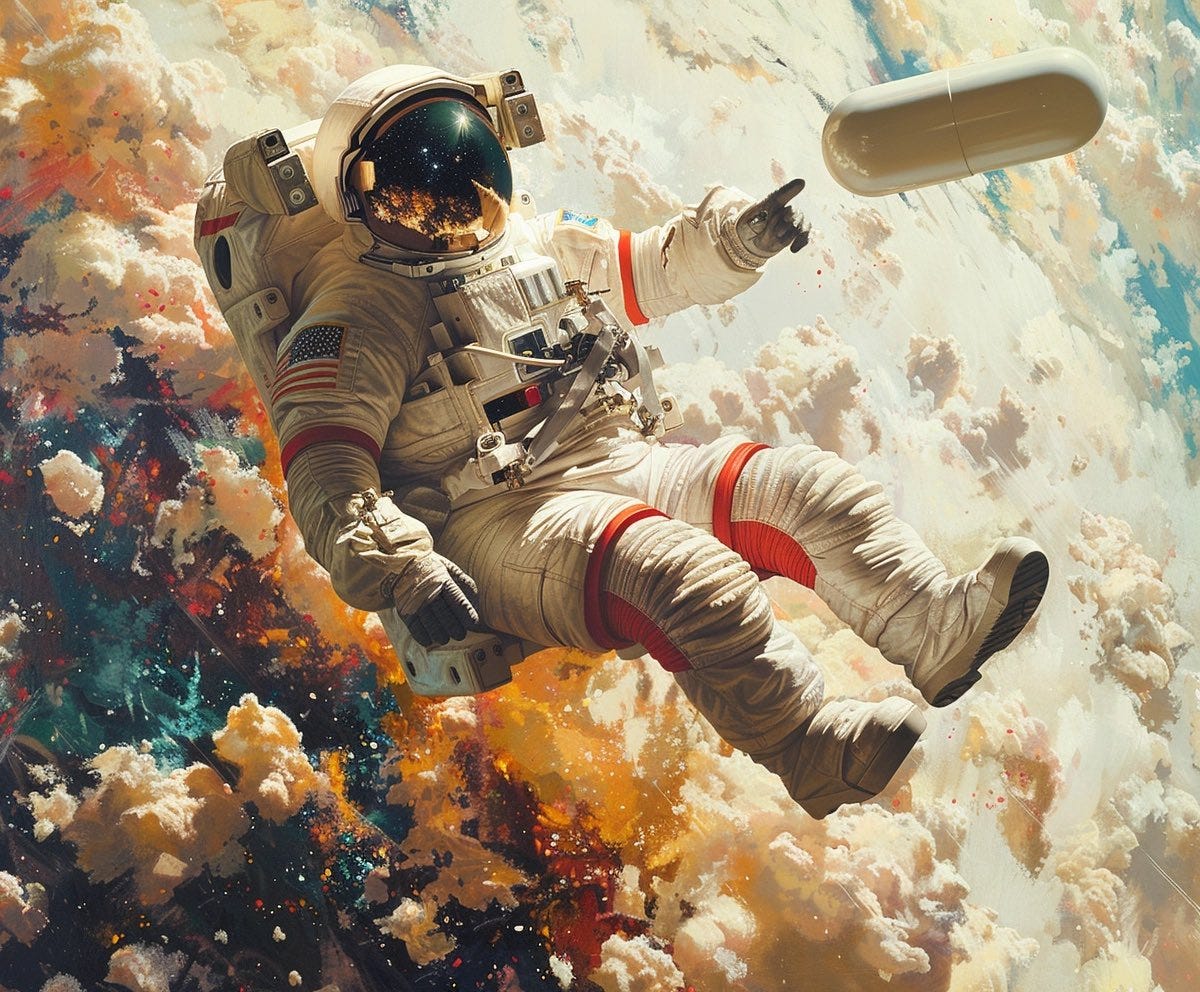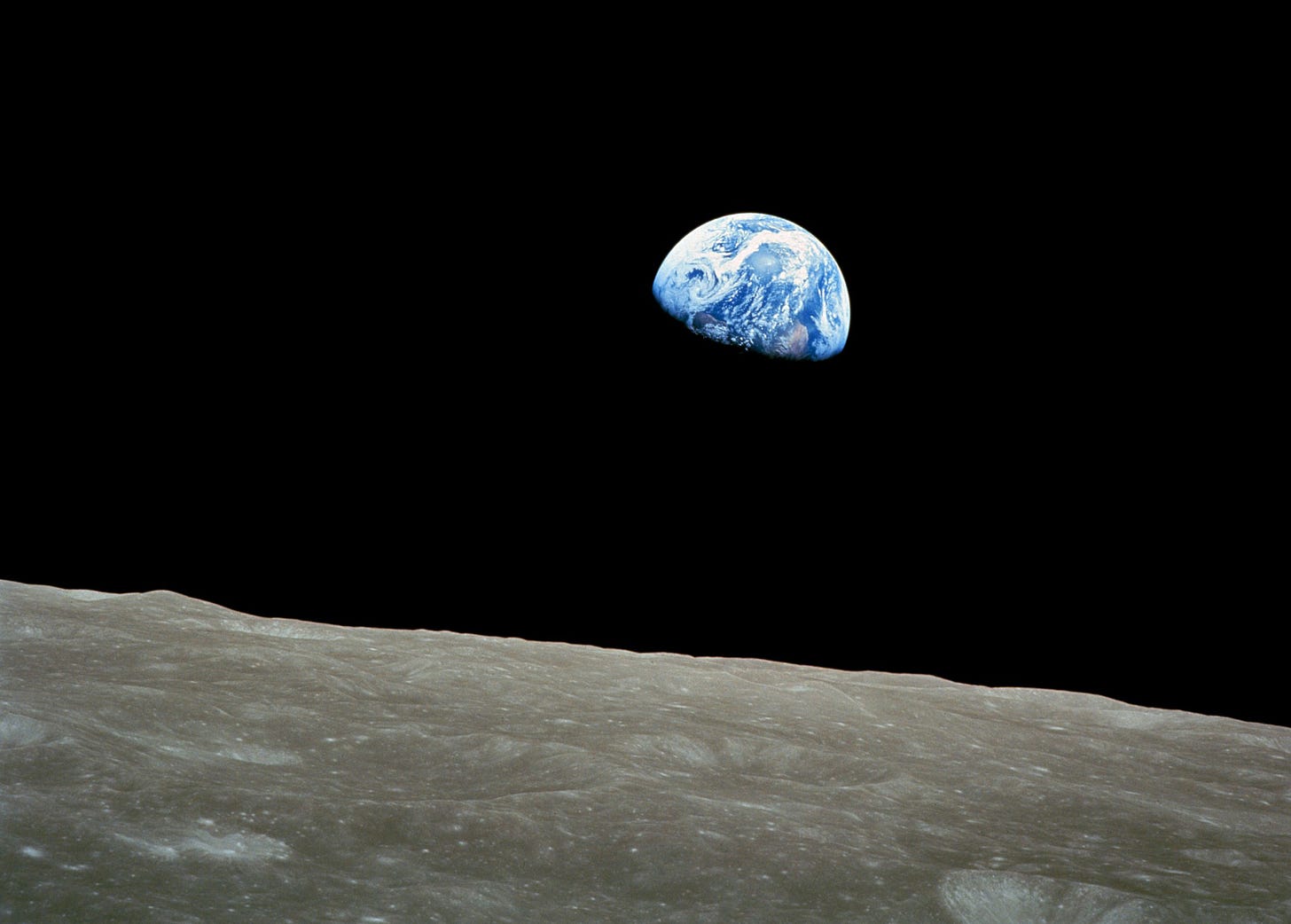"History is a shared consensus about the past which is used to help understand the present...These shared stories are important, but they are cherry picked"
- Every Angel Is Terrifying
*Before beginning this week’s post - I would encourage every single one of you to watch the video I’ve linked above. It touches upon some of the topics I get into and is overall an immersive shift of perspective for those open to it.*
Black Pill(s)
Fraternal Fragility
We've all heard overtures that frame history as being "written by the victors" which is true. Doesn't mean the history of the losing side will never see the light of day but rather that the narrative, which can last for decades if not centuries, is altered by those who win.
Look no further than the invasion of Iraq in 2003 where after 9/11 claims were made by the Bush administration that Iraq possessed WMD's and had ties to Al-Qaeda - neither of which turned out to be true. And yet these claims and the consequential War on Terror led to the deaths of millions of innocents all the while a good chunk of the American population supported these operations. Saudi Arabia's obvious involvement was obfuscated and replaced with another historical narrative by the victorious force - among the many lies told during those years.
Most people believe that there was only one Renaissance which originated in 15th century Florence. However during the period known as the Dark Ages (476AD - 1420AD) there was also the Carolingian Renaissance. During this time Carolingian workshops produced over 100,000 manuscripts of knowledge - this time period is characterized by the transition from the scroll to the codex (book) format.
In fact a good chunk of what we know of Ancient Rome came from these manuscripts, including the works of some of our most ancient thinkers: Cicero, Horace, Lucretius, and Caesar. There are claims that many of these Carolingian workshops that worked to transcribe scrolls into codexes also destroyed thousands of these scrolls in the process. The reason? To rewrite a history of their choosing.
I'm not versed in the history of this so I have no way of disputing or agreeing with this. However, when's the last time you looked at a history textbook that your grandparents had when they were in school? I'd bet all my earthly possessions that they omitted a good chunk of what was done to the aboriginals during the time of colonization. Or if they did mention them then it was simply as a footnote to say some tribes were hunter-gatherers and others were nomads. And if it wasn't the natives then it was the European expansion, Cold War, World War I - you name it. Point is, the history we think we know is a carefully constructed narrative based on selected stories and not simply on the amalgamation of all surviving facts and records.
"Fragile threads of evidence weave our shared philosophical narrative"
- Every Angel Is Terrifying
I make this point not to say that history is fake but rather that it is malleable. That the records which survive fires, wars, and revisionism are what we are left to believe. And that its malleability can be affected by forces of nature and that of mankind. The consequences of a tragedy from either force can shape the timeline and leave it unchanged for centuries.
Think of all the various technologies that were documented on parchment that have burned over the years. Or the works of those that were considered heretics that were destroyed by either the state or the church. Entire philosophies erased, cultures wiped out, and languages lost - almost impossible to wrap your mind around.
Of the many instances in which this has happened there is one that stands out above them all: The Library of Alexandria. Though the story goes that it was a fire that resulted in significant damage - the reason for its destruction remains unknown. Some say it was the invasion of Julius Caesar that resulted in its end - others believe that as the centuries went on the various rulers that took over ended up dismantling the library as they perceived its existence as a threat to their power. Whatever the reason, there is no denying that the thousands of scrolls within the library contained an unmatched abundance of knowledge that could not be found elsewhere.
1600 years before Columbus set sail - the great scholar Eratosthenes was able to use the library to deduce that not only was the Earth round but also estimate its circumference and radius within a few miles. And Heron of Alexandria - with the help of the library - was able to create the world's first steam engine over 1000 years before it would be reinvented during the Industrial Revolution.
It is a tragedy that no physical remains of the ancient Library of Alexandria have survived to the present day. Who knows how much of the knowledge of the ancient world was wiped out with its destruction. It's impossible to measure how many technological innovations we would have now had it not been destroyed. Or how much of our philosophies and cultures could have shaped humanity's ongoing evolution in a myriad of ways.
Mind you this incident may be the most popular but it is certainly not the only instance of an immense amount of information being lost to the sands of time. There is the destruction of the House of Wisdom in Baghdad, Spanish conquest of the Aztec Empire, destruction of Nalanda University, and Bonfire of the Vanities to name a few. These are the only examples of which we have evidence of - who knows how many occurred without any written record?
Why does this matter? The storage and translation of past human knowledge is what has shaped our world into what it is presently. Historical narratives written by victors, inventions designed by monumental men, and cultural artifacts are all that we can rely on to understand humanity's shared history. And though it seems the times of Alexandria are long past us - our ability to record information and store it for future reference remains precariously positioned.
We're in the midst of an age where memorization is becoming unnecessary when you have a supercomputer that can recall just about any available information at a moment's notice. An age where people are more likely to pick up an e-book or read an article on their phone instead of buying a newspaper subscription or visiting a library. That's not to say that analog forms of recordkeeping are going to die - but that there has been a drastic shift towards the digital landscape.
This poses a problem when you consider the fragile state of our digital ecosystem. Liable to manipulation and destruction from natural disasters, foreign attacks, and infrastructure failures all the same. Especially when this data is centralized within a single system regardless of security measures.
For the uninitiated, up until 2014 it was believed that Apple's iCloud was safe and secure as can be. And yet it wasn't until a bunch of celebrity nudes were leaked in an event dubbed as "The Fappening" that this notion was dismissed.
More recently, Google Cloud experienced an unprecedented incident where it accidentally deleted the entire cloud environment of UniSuper, a major Australian pension fund managing over $80 BILLION in assets.
And only 8 days ago ChatGPT experienced a major outage that lasted several hours which impacted millions of users around the globe. Not only did this impact those that used ChatGPT but also every application and wrapper that used their API including Perplexity and Rabbit R1. Think of all the businesses that use ChatGPT in their services: Slack, Shopify, Hubspot, Quizlet, Snapchat, Salesforce, Air India, Microsoft, Duolingo, Bain & Company, and hundreds if not thousands more were affected by the outage.
Do you get the picture yet? Do you understand just how fragile our global data ecosystem is? Any number of things can happen - manmade or otherwise - where millions will be affected and there's not a single thing any single person can do about it.
This is all to say that humanity has not found an effective method of long-term data storage that is able to outlive natural disasters, malicious actors, or hardware failure. Perhaps there is no silver bullet to fixing this issue for we are not invincible and nothing can withstand the sands of time.
And yet this presents us with an opportunity - to take the failures of the Library of Alexandria and learn from it. Their scholars centralized all their knowledge into one single place and presently it looks like decentralization is becoming the name of the game. Maybe the coming advent of AI can even help us better understand why the current historical narratives exist as they do and what pieces could be missing from their greater context.
Then again, history repeats itself and we could be overdue for a fire unlike anything we've ever seen before with terabytes and texts lost to the æther like tears in the rain.
White Pill(s)
Space Cowboys
Whether we realize it or not - we are in the midst of the Space Age. Right now there are millions of people around the globe working on various projects that with every passing day bring us closer to becoming an interstellar multiplanetary species. And ultimately this should matter to just about everyone on Earth as the results of this endeavour will affect each and every one of us in ways we cannot predict. Not to mention the benefits that will be reaped by the future generations that will inherit the Earth and what we leave behind. It may be one of the few things that humanity as a whole can unite and collaborate on.
Don't know about you but I for one am a pro-human "speciest". We've been given the mother of all opportunities with a planet that has just about every resource we need, is located in the perfect distance away from the Sun to maximize growth, and with a potential second home at Mars which is thought to have been like Earth at one point.
And that's just 3 qualities that I know off by hand - I'm sure there's a myriad of other reasons beyond my understanding that can explain the millions of events that would need to happen for us to exist on this planet here and now. It would be a shame, to say the least, for humanity to waste this opportunity we've been given and remain a single planetary species when there is so much more out there beyond our current grasp waiting to be explored.
Not to mention the fact that there are tons technological benefits available to the greater public today as a result of past and ongoing space missions. Here's a few examples:
Memory foam
Digital imaging censors (used in all cameras/smartphones)
Freeze-dried food
Scratch-resistant lenses
Invisalign
Cordless power tools
Advanced water filters
GPS
Cochlear implants (advanced hearing aids)
LASIK
Bowflex
Solar cells
And these are just the ones that the NASA missions have contributed directly to. If you extrapolate far enough I'm sure there's dozens more innovations and technologies that can be added to the growing list. AND it's not even counting the vast sums of knowledge that has been collected on our planet, weather systems, material science, gravity experiments, and many more fields of study that have all benefited from space exploration. We would not be where we are today as a species without those that dare to dream of the stars.
You develop an instant global consciousness, a people orientation, an intense dissatisfaction with the state of the world, and a compulsion to do something about it. From out there on the moon, international politics look so petty. You want to grab a politician by the scruff of the neck and drag him a quarter of a million miles out and say, 'Look at that, you son of a bitch.'
- Edgar Mitchell
I for one would love to have the opportunity someday to see Earth from space if only to experience what's known as the Overview Effect. According to the accounts of those that have seen the Earth from space this effect is characterized by a profound appreciation for the beauty and fragility of our world. A feeling of connectedness with humanity as a whole. It's been known to cause a shift in values and priorities in some with a greater emphasis on global issues that unite us as a species.
Now imagine if this experience was not reserved to the lucky few that train all their lives just to get a glimpse of it. Imagine if some day this experience becomes accessible to a critical mass of people. Think about how it would change our priorities as a species if enough were able to have this transcendent experience.
This can only be possible if space tourism is made affordable so that the average person can experience the Overview Effect at least once in their lifetime. As it stands the current options are limited to millionaires and billionaires as the cheapest flight would cost you $125k minimum.
Other options go as high as $55 million according to the deal signed between Axiom Space and Saudi Arabia where 2 Saudi astronauts joined the SpaceX Crew Dragon mission last May. Now this is a far cry from enabling space tourism for those with a couple $100k lying around or the exuberant wealth of an oil-rich state to back them but we have to start somewhere. As the technology improves, material sciences evolve, and more companies join the race it will eventually become a competitive enough market which will drive the prices down. It is only a matter of time until such a thing is possible and we must Accelerate boldly in that direction.
And I haven't even gotten into all the cultural benefits and impacts of the Space Race of the 60's. Think about all the national pride that people must have felt in either the US or USSR when they witnessed their flag take flight on their respective missions. Almost impossible nowadays to picture the level of patriotism that was felt by large swaths of society. Or how it must have aligned and united so many people across a multitude of backgrounds with one single goal: to be the first.
Think of how many people were incentivized to join STEM (Science, Technology, Engineering, Mathematics) fields just from the sheer excitement and possibility of aiding in the Space Race. In the US alone the National Defense Education Act of 1958 provided over $1 BILLION in funding for STEM education at all levels. This included student loans, graduate fellowships, and improvement of teaching in science, math, and foreign languages.
Now imagine what could happen if such a mission was to re-enter the zeitgeist in all its importance. Imagine what humanity could be capable of if this endeavour was to unite entire nations. Idealistic? Sure, the billionaires like Musk are already doing it without any additional encouragement and besides we got our own problems down here on the ground to worry about. And surely this really only concerns those that live a comfortable enough life, like you and me, where taking time out of your day to even think about space exploration is a luxury we can afford. But that doesn't mean we shouldn't support these missions and space exploration as a whole.
Like I mentioned earlier - there are a myriad of benefits that trickle down through inventions and scientific discoveries that most of us directly benefit from on a daily basis. And in our growingly divided world it seems as though space is one of the few challenges that can truly unite us as a species.
We have an opportunity before us to explore the final frontier - the last unknown that stretches out beyond our understanding in ways we cannot entirely comprehend. And if not explore ourselves then build the foundations upon which future generations can do so in the pursuit of becoming an interstellar multiplanetary species.
Like many, I believe our expansion to the stars is a worthwhile endeavour. This planet - though essentially perfect - cannot and should not be our final resting place. There is so much out there left to do and experience - and I for one am excited.
Now watch the video below and tell me it doesn't give you goosebumps.
That about does it for this week's White Pill Wednesday newsletter - hope you enjoyed reading and be sure to share it, we could all stand to be a little more whitepilled!
You can find me on Twitter as @Wh1tePill where I post more often.
















